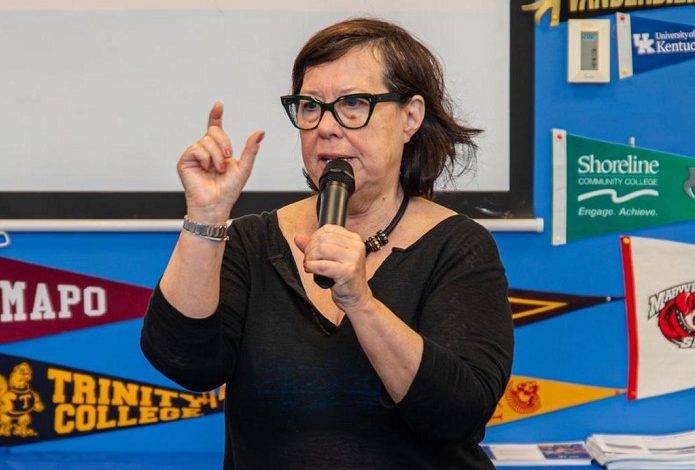ARTICLE AD
 Ms Wachter
Ms Wachter
An expert in election misinformation from the United States (US), Sarah J. Wachter, has urged the media in Ghana to incorporate fact-checking into their routine news dissemination.
Fact-checking is modern category of journalism, where speeches, news articles, rival multimedia contents and others are verified and packaged as a separate news item in an effort to combat misinformation.
In an interview with the Ghanaian Times on Wednesday at the US Embassy in Accra, Ms Wachter said fact-checking had become crucial, especially as Ghana heads to polls because misinformation was a threat to peaceful elections.
She was in Ghana as part of a week-long programme on election misinformation for the Ghanaian traditional and digital journalists in Kumasi and Accra, organised by the US Embassy.
As part of the programme, practising and student journalists and stakeholders from the Ghana journalists Association, the University of Media Arts and Communication and other civil society organisations were sensitised on misinformation.
According to Ms Wachter, it was recommended that large media houses had an in-house fact-checker, not just for these elections but in general, and due to funding issues, media houses could join forces.
Citing a case in Nigeria as an example, she said Ghanaian media houses could form an alliance and create “a war room” where all the major media houses would put journalists and collaborate on fact-checking.
“So that they’re not all fact-checking the same claim but actually being able to fact-check many more claims. And this is something that was used in Nigeria by Dubawa as well. So creating a sort of a coalition and collaborating rather than competing, and fact-checking is something else that can be done,” she said.
On the global scale, Ms Wachter said misinformation had become a bigger threat as for the first time a record-breaking number of about four billion people from 50 countries are going to be voting in elections.
She said there had been signs in the elections that have already taken place in places like Taiwan, Indonesia, and Slovakia, which shows that there is the need to take the issue of misinformation seriously.
In Ghana, she said about 70 per cent of the population had access to the internet and as more people got access to social media for different purposes, it becomes a powerful tool for misinformation.
Ms Wachter said journalists had been taught techniques that would help them get ahead of the disinformation curve and also create public awareness about misinformation.
Press Attache at the US Embassy, Kevin Brosnahan, said following the first high-profile example of misinformation in the 2016 US elections and how social media had amplified such acts, it was crucial that journalist were trained to avert the impact of such practices as both Ghana and US go to the polls this year.
“Social media has good and bad sides. It’s given everybody a voice in politics or policy or human rights or other things and that’s good, but it’s also given voice to those that want to do harm and those that want to undermine elections or undermine democracy. So that’s where we have to make sure we have safeguards in place.”
BY JONATHAN DONKOR
Read Next
March 19, 2024
10 KoKMA staff undergo training in solid waste management, circular economy in Russia
March 19, 2024
Gov’t working to build robust internet infrastructure – Communications Minister
March 19, 2024
EOCO grabs 4 over alleged GH₵113, 947 mobile money, SIM swap fraud
March 18, 2024
GhIE, Prof. Douglas Boateng co-launch annual lecture series
March 18, 2024
There’s adequate food supply to all SHSs – Education Ministry assures
March 18, 2024
Queenmothers urged to take advantage of PFJ 2
March 18, 2024
Alhaji Kabore donates Ramadan items to Nsawam inmates
March 18, 2024
ICODEH, EMIRATE RED CRESCENT LAUNCH RAMADAN PROJECT 2024 TO SUPPORT NEEDY
March 18, 2024
‘We will stay the course’ – Amin Adam assures IMF MD
March 18, 2024

 9 months ago
79
9 months ago
79 

